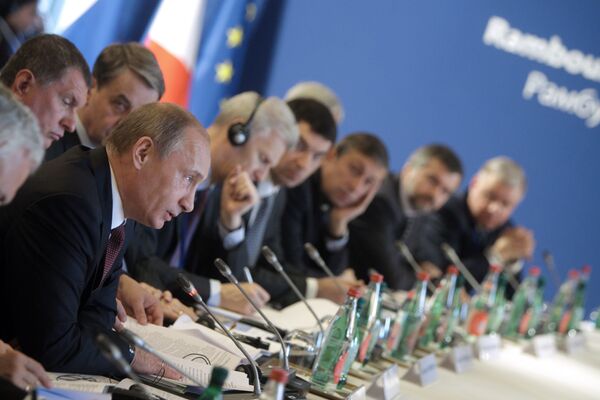MOSCOW. (RIA Novosti political commentator Andrei Fedyashin) – Russian Prime Minister Vladimir Putin is meeting with his French counterpart, Francois Fillon, in Paris to lay the economic foundation for political relations.
The Rambouillet Palace, where the two heads of government will meet, is having a “Russian day.” Vladimir Putin has brought a series of commercial proposals from Russian businesses, and Fillon is expected to respond with proposals of his own. By the end of this day, the talks will have resulted in a dozen economic agreements. All this would have sounded much less special had it not been for the scale and potential consequences for their economies and foreign relations alike.
Reports that one possible subject under discussion could be the French helicopter carrier ship deal, have already worried Georgia and the Baltic states. Mistral-class assault ships are truly exceptional; without going into too much technical detail, the French navy calls them the “Swiss army knives” due to their wide range of functions.
The Baltic states are concerned that Mistrals could be used against them, and Georgia certainly has no desire to see the ships near its waters. Meanwhile, the Russian navy’s top officials are well aware, without openly admitting it, that Russian shipyards will not be able to equal the Mistral for quite a long time to come. They also know that they need to replace their old warships.
While Mistrals will not be the prime focus of Putin’s visit, they will be its highlight. They alone do not justify flying to Paris. Nor would it have been appropriate to take such a large group of business leaders to France just to buy one helicopter carrier. The delegation includes the heads of nearly all Russia’s oil, gas and energy producers, automakers, aircraft builders, banking and finance institutions among others. The complete list would take up a whole page.
This visit is expressly commercial; it could be likened to Peter the Great’s Great Embassy to Europe, only it is purely commerce-oriented. They are expected to sign around 25 major agreements in various areas of business. Renault will agree to patch up AvtoVAZ; France will become a partner in South Stream; Total may get access to Russian energy markets, etc.
Most importantly, all the agreements signed will be for the long term. In previous meetings, Russian and French leaders have repeatedly talked of “coinciding strategic interests.”
However, all these noble thoughts of developing areas of mutual interest will mean nothing unless real action follows. This may sound contrived and dogmatic, but which of the two counties’ interests could really coincide? The answer is none, except probably their efforts on climate change. The rest is a myth, unless we consider fighting marine piracy a coinciding interest.
Even after the election of new EU leaders, Russia-Europe relations will not change. There are no big problems between Moscow and Brussels. There are some problems between Russia and particular EU countries that need to be resolved bilaterally, rather than on a supranational level. Similar issues have been successfully tackled with Germany and Italy, the same process is underway with France.
This does not mean that Russia wants to split the European Union. Moscow supports the EU’s ambition to speak with one voice, but only wishes that this voice could also consider our interests. Until it does, we have no choice but to protect and further our national interests through bilateral contact.
France is one of the leading countries in the European Union; therefore, many of the EU members, especially in Eastern Europe, are concerned by our bilateral approach.
Before France’s most recent round of presidential elections, Russia again tried to decide which outcome would better suit its interests. The conclusion then was that Nicolas Sarkozy was the worse option, because of his pro-NATO orientation. However, it soon became clear that things were not all that bad and that Sarkozy was not, after all, so NATO-oriented.
Then the questions became more complicated and daunting: which combination is better, Putin-Chirac or Medvedev-Sarkozy? The names and titles could be changed or swapped here, the essence will not change.
No one questions the importance of good personal relations between national leaders. The challenge is not letting international relations depend entirely on the personal relations between the respective leaders.
Putin did not go to France to build contacts between Moscow and Paris. Foreign policy is in fact the president’s prerogative. He has come to lay the economic foundations for the smooth development of political relations between the two countries.
International relations should not depend on a specific person sitting in the Kremlin or the Elysee Palace. They should develop consistently and independently of any individual leader. The term might sound undiplomatic, but presidents and prime ministers should in fact become “hostages” to the positive changes achieved by their predecessors, as has always been the case with France.
Russian-French relations have never been all that smooth. On the other hand, since Charles de Gaulle (who was always a friend of Russia), they have seen no major ruptures either. He never believed any idiotic rumors about Russia, even in the Soviet era. When he was in Moscow in 1966, his wife, Yvonne, told him at dinner that Russians could add some mysterious poison to meals which would kill a person in five years rather than immediately. He told her, laughing, that at their age it was a risk they could afford to take, he was, after all, 76 years old.
The opinions expressed in this article are the author's and do not necessarily represent those of RIA Novosti


